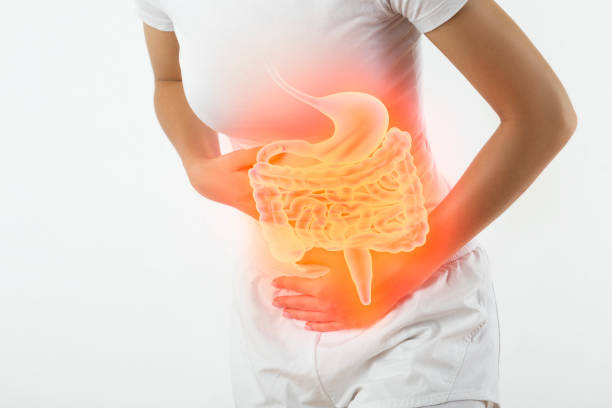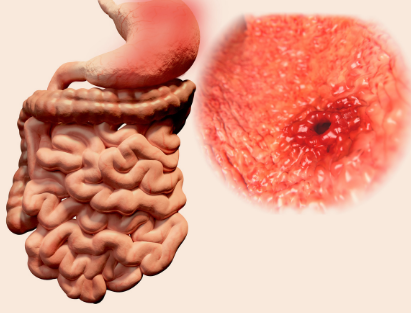
Dr Kelechi EgbulemhealthcareJuly 12, 2023
Stomach ulcer also known as gastric ulcer is a common cause of abdominal pain in our society. It literally means having a wound on the inner wall of the stomach. It commonly results from a chronic infection from the bacteria Helicobacter Pylori (H. pylori)
Stomach ulcer also known as gastric ulcer is a common cause of abdominal pain in our society. It literally means having a wound on the inner wall of the stomach.
It is commonly caused by a chronic infection from the bacteria Helicobacter Pylori (H. pylori) which is very prevalent in developing countries. Most of the time, this bacteria is transmitted through the faeco-oral or oral-oral route.

The pain from a stomach ulcer can spread from the middle of your tummy to your neck, belly button, or back. It can last for a few minutes to a few hours and often begins shortly after eating. You might also wake up in pain during the night.
The pain from a stomach ulcer can feel like a burning sensation in your stomach that spreads to your chest, similar to heartburn.
There are several causes of stomach ulcer such as:

A duodenal ulcer is a sore or lesion that develops in the lining of the duodenum, which is the first part of the small intestine. Symptoms of a duodenal ulcer can include abdominal pain, bloating, nausea, and vomiting. Treatment typically involves medications to reduce stomach acid production, antibiotics to eradicate H. pylori, and lifestyle changes to promote healing.
Pancreatitis is inflammation of the pancreas, a gland located behind the stomach that plays a key role in digestion and blood sugar regulation. There are two main types of pancreatitis: acute and chronic.
An uncomplicated hiatal hernia occurs when the upper part of the stomach bulges through the diaphragm into the chest cavity. It’s usually not serious and may not cause any symptoms.
However, some people with a hiatal hernia may experience heartburn, chest pain, or difficulty swallowing. Treatment typically involves lifestyle changes, such as avoiding large meals, losing weight, and avoiding tight clothing. Medications to reduce stomach acid or surgery may be recommended in severe cases.
Atrophic gastritis is a chronic inflammation of the stomach lining that leads to the loss of stomach lining cells and their replacement by other types of cells. This condition can reduce the stomach’s ability to produce digestive juices and absorb nutrients, leading to digestive problems and nutrient deficiencies.
Atrophic gastritis is often caused by a bacterial infection with H. pylori or by an autoimmune reaction where the body’s immune system mistakenly attacks the stomach lining. Other risk factors include long-term use of certain medications, chronic bile reflux, and aging.
Symptoms of atrophic gastritis can vary but may include stomach pain or discomfort, bloating, nausea, vomiting, and weight loss. However, some people may not experience any symptoms.
Treatment for atrophic gastritis aims to manage symptoms, prevent complications, and address underlying causes. This may include medications to reduce stomach acid, antibiotics to treat H. pylori infection, vitamin B12 supplements to prevent deficiency, and dietary changes to reduce irritation to the stomach lining. In some cases, endoscopic surveillance may be recommended to monitor for complications such as stomach cancer.
Cholecystitis is inflammation of the gallbladder, usually caused by gallstones blocking the bile ducts. Symptoms include severe abdominal pain, nausea, vomiting, and fever. Treatment often involves pain management, antibiotics, and, in severe cases, surgery to remove the gallbladder (cholecystectomy).
Irritable bowel syndrome (IBS) is a common digestive disorder characterized by abdominal pain, bloating, and changes in bowel habits such as diarrhea, constipation, or both. The exact cause of IBS is unknown, but factors such as abnormal gastrointestinal motility, visceral hypersensitivity, inflammation, and changes in gut microbiota may play a role.
Symptoms of IBS can vary widely among individuals and may be triggered by certain foods, stress, hormones, or other factors. There is no specific test for IBS, so diagnosis is based on symptoms and the exclusion of other conditions.
Treatment for IBS focuses on managing symptoms and improving quality of life. This may include dietary changes, such as avoiding trigger foods or following a low FODMAP diet, as well as stress management techniques, medications to relieve symptoms, and counseling or therapy for psychological symptoms related to IBS.
A benign stomach ulcer may worsen resulting in complications. Bleeding is the most common of complications. It could be visible when the individual’s vomitus contains blood that may appear bright red or brownish.
It could also be noticed when the individual’s stool is black in colour or has frank red blood. When a blood clot is noticed it is an indication that the bleeding is much.
Gastric outlet obstruction is another complication which results when the area around the ulcer is swollen and prevents food from leaving the stomach into the small intestine. It results in vomiting of stomach contents which would appear as stale food.
erforation of the stomach results when the ulcer in the inner wall of the stomach extends to the outer wall, discharging the stomach contents into the peritoneal cavity and causing worsening symptoms. These complications may further lead to infection, shock, multiple organ failure and sadly death.

It is never too early to seek the advice of a medical doctor if you experience signs of stomach ulcer, or any type of tummy pain. Symptoms may appear little but it is a pot-hole that will someday turn to gully erosion. This is because, untreated stomach ulcers can degenrate to gastric cancer.
Gastric cancer should send shivers down the spine of anyone. Although not common, this cannot be detected on time except when you go through a proper examination at the hospital. The fact remains that cancer is CURABLE when found on time. And if checking the condition of your stomach matters to you, do well to Consult a Doctor on KompleteCare.
Questions (medical history) would be asked and physical examination will be carried out to help guide investigations. Due to its high prevalence, tests are usually ordered for the presence of H. pylori infection which could be done either with blood, stool or a breath test. Other investigations that may be ordered include a barium meal and lastly an upper gastrointestinal endoscopy.
The endoscope is a long flexible tube with a camera at its tip that is passed down the individual’s throat and into the stomach.
It is the one investigation that helps confirm the presence of an ulcer in the stomach. It has the advantage of looking at the entire inner wall of the stomach to locate ulcers and also take samples which are sent for histology to help rule out the dreaded gastric cancer.
Abdominal ultrasound is not used for the diagnosis of stomach ulcer but it helps in ruling out other causes of abdominal pain or to help detect the presence of fluid in the abdomen which may result from perforation of the stomach. Other investigations that may be asked for may be used in getting the physiological condition of the individual or help ruling rule out other disease conditions.
Treatment of stomach ulcer is guided by its cause. For H. pylori infection, the goal of treatment is to eradicate the bacterium for which antibiotics are prescribed. It is added to agents that reduce the production of stomach acid.
Commonly referred to as triple therapy as three medications are given at the same time for which two are antibiotics. The various combinations used would depend on a lot of factors like resistance to previously used medications or even reaction to a given drug by the individual.
Where an offending agent is found to be the cause like NSAIDS, smoking, or binge alcohol drinking, avoiding them would help a long way in the treatment of the ulcer.
Antacids and drugs to reduce stomach acid are given in the absence of infection. Medications are also given to control pain.Surgical management of stomach ulcer is now on the decline but it is the main stay of treatment when cancer is involved or in the management of complications.

Stomach ulcers are one of the most common illnesses that can be treated via telemedicine. this means that you do not necessarily have to visit the hospital to get medical help fom doctor for your stomach ulcer. You can simply consult a doctor online through video or voice call and have your stomach ulcer concerns addressed.
Things may be hard currently, but they would surely get better one day. A symptom may look very small and insignificant today and you might be tempted to overlook it or say other people treat theirs like this why should mine be different.
Every human on the face of the earth is unique and as such different. Seeking the advice of a medical doctor on time is very important as the prognosis is far much better and it is much cheaper than managing the complications on your own as they arise.
Don’t be caught napping. The earlier you seek care, the more likely you are to getting solution in time. Speak to a Doctor today!
healthcareOctober 17, 2025
healthcareSeptember 10, 2025
healthcareFebruary 27, 2025
healthcareAugust 20, 2025








